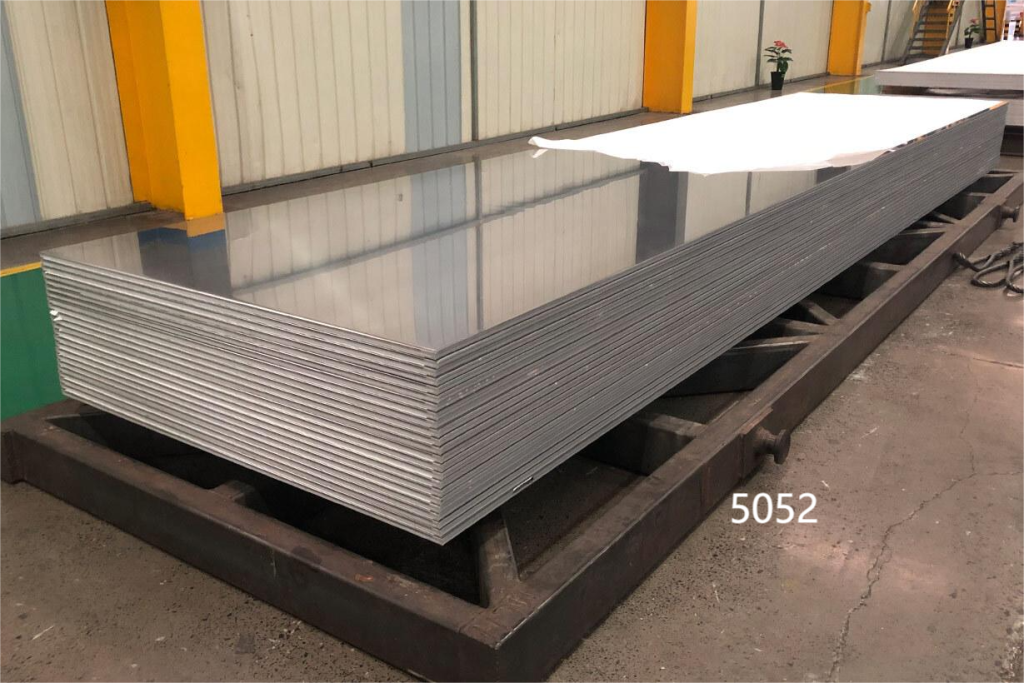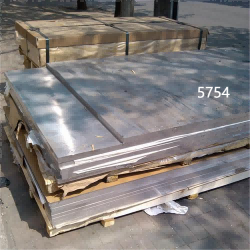Aluminum plates are widely used in various industries due to their excellent properties. Among the common aluminum alloys, 5052 and 5754 aluminum plates are frequently used. They have distinct differences in chemical composition, mechanical properties, and application areas. Here’s a detailed analysis and comparison of these two aluminum plates:
Composición química
5052 Aluminum Plate:
– Magnesium: 2.2% – 2.8%
– Chromium: 0.15% – 0.35%
– Low content of manganese, silicon, iron, and other impurities
5754 Aluminum Plate:
– Magnesium: 2.6% – 3.6%
– Manganese: 0.10%
– Iron: 0.40%
– Silicon: 0.40%

Propiedades mecánicas
Fuerza:
– The tensile strength of the 5052 aluminum plate ranges between 210-230 MPa, with a yield strength of around 130 MPa.
– The tensile strength of the 5754 aluminum plate is around 260 MPa, with a yield strength of around 150 MPa.
Ductility:
– 5052 aluminum plate has good ductility and formability, making it suitable for deep drawing, bending, and other processing techniques.
– 5754 aluminum plate has slightly higher ductility and strength compared to 5052, making it suitable for applications requiring higher strength.
Resistencia a la corrosión
Both 5052 and 5754 aluminum plates have excellent corrosion resistance. However, due to the higher magnesium content, 5754 aluminum plate offers superior resistance in saline and industrial environments.
Welding Properties
Both 5052 and 5754 aluminum plates have good welding properties, suitable for gas welding, arc welding, spot welding, and other welding methods.

Application Areas
5052 Aluminum Plate:
– Marine Industry: Widely used in shipbuilding for exterior panels and interior components due to its excellent corrosion resistance.
– Automotive Industry: Suitable for fuel tanks, car body shells, and other parts.
– Construction Industry: Used for building exteriors, roofs, doors, and windows.
– Electronics and Appliances: Used for electronic product enclosures and battery casings.
5754 Aluminum Plate:
– Marine Industry: Used for ship structures and decks, especially in areas requiring high strength and corrosion resistance.
– Transportation: Used for manufacturing chassis, fuel tanks, and truck bodies, particularly in areas requiring high strength and fatigue resistance.
– Chemical Equipment: Used for manufacturing chemical equipment and storage tanks, especially in corrosive environments.
– Construction and Decoration: Used for building exteriors and decorative panels, especially in harsh environments.
Conclusión
Both 5052 and 5754 aluminum plates have their advantages and should be chosen based on specific application scenarios and performance requirements. The 5052 aluminum plate offers good ductility and formability, making it suitable for marine, automotive, and construction industries. The 5754 aluminum plate offers higher strength and better corrosion resistance, making it ideal for marine, transportation, and chemical equipment industries.
Choosing the right aluminum plate can improve product quality, extend service life, and reduce maintenance costs. Therefore, it is crucial to consider the performance characteristics and specific application needs when selecting materials.


